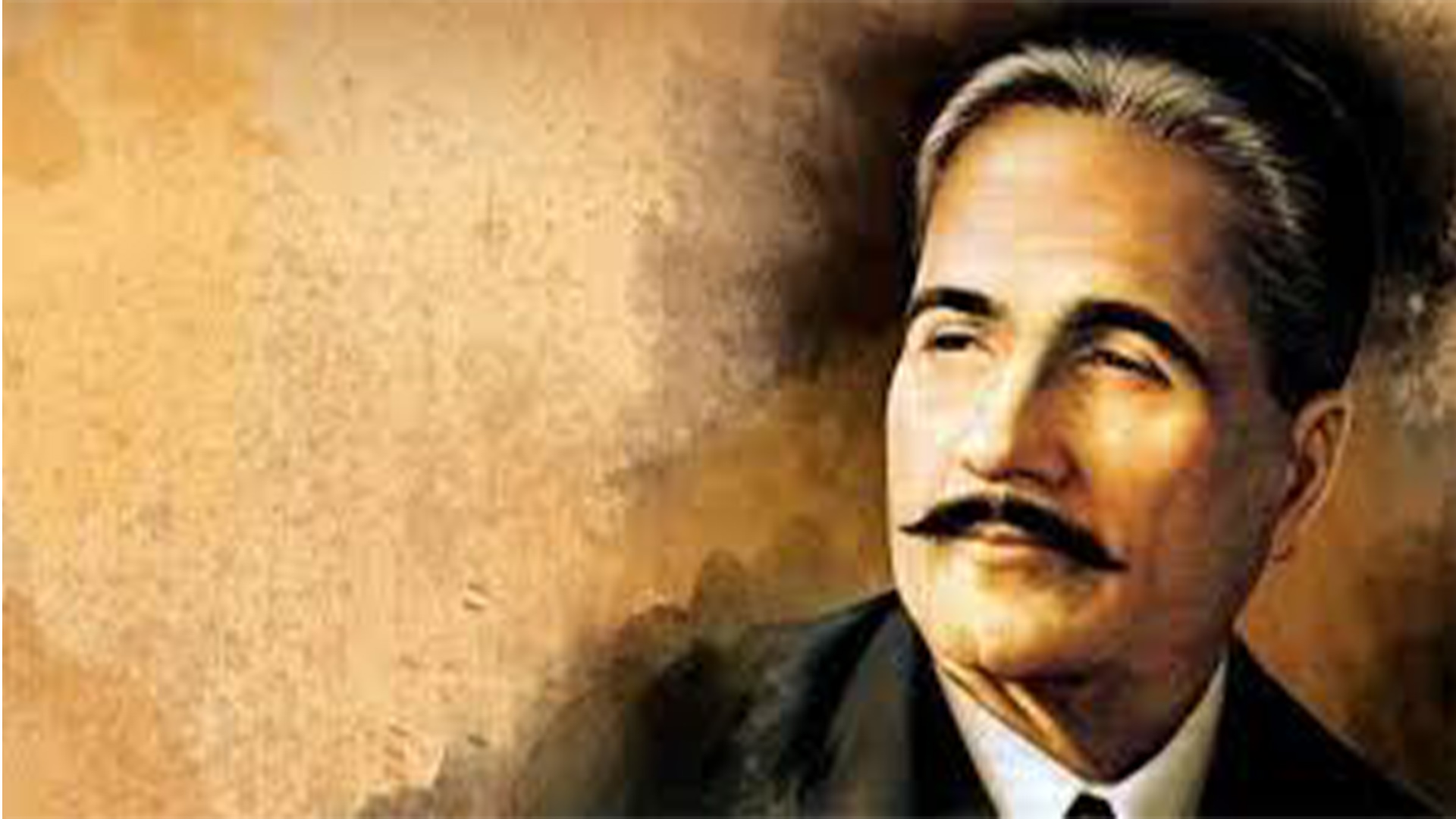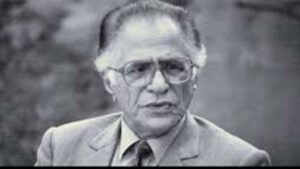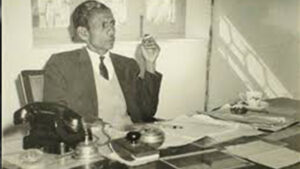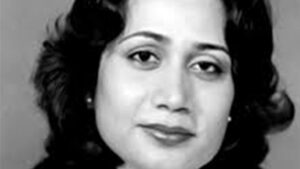Sir Muhammad Iqbal (1877–1938) was a prominent philosopher, poet, and politician who is widely regarded as one of the most influential figures in 20th-century Islamic thought and Urdu literature. His works inspired many, particularly in the context of Islamic revivalism and the creation of Pakistan. Here is an overview of his life and legacy:
Early Life and Education:
- Born: 9 November 1877 in Sialkot, Punjab, British India (now Pakistan).
- Education: Iqbal was highly educated, with an early education at Scotch Mission College and Government College, Lahore. He later studied in England at Trinity College, Cambridge, and in Germany at the University of Munich, where he earned a PhD in philosophy in 1908, with his thesis titled “The Development of Metaphysics in Persia.”
Literary and Philosophical Contributions:
Iqbal’s poetry and philosophical ideas are considered revolutionary and continue to have a significant impact. His main works include:
- Bang-e-Dara (1924) – A collection of poems that brought him fame.
- Asrar-e-Khudi (1915) – The Secrets of the Self, a Persian work that introduced his philosophy of self-realization.
- Rumuz-e-Bekhudi (1918) – The Secrets of Selflessness, a follow-up to Asrar-e-Khudi.
- The Reconstruction of Religious Thought in Islam (1930) – A series of lectures in which he called for a spiritual and intellectual revival of Islam.
- Javid Nama (1932) – A Persian philosophical epic.
- Tarana-e-Milli (1924) – The Anthem of the Community, a poem calling for unity among Muslims.
Political Vision and Role in the Pakistan Movement:
- Iqbal was a strong advocate for the political and spiritual revival of the Muslims in the subcontinent. His Allahabad Address (1930) is particularly notable, as it laid the groundwork for the two-nation theory and the creation of Pakistan. In this speech, he envisioned an autonomous Muslim state in the north-western regions of India.
- Iqbal served in the Punjab Legislative Council and was active in the All-India Muslim League, where he played a key role in advocating for Muslim rights and their political future.
Legacy and Influence:
- Iqbal is honored as Mufakkir-e-Pakistan (The Thinker of Pakistan) and Hakim ul-Ummat (The Wise Man of the Ummah). His vision for Pakistan, both as a political entity and as a state for spiritual and intellectual renewal, was realized after his death in 1947 with the creation of Pakistan.
- His birth anniversary, 9 November, is celebrated as a national holiday in Pakistan.
Iqbal’s poetic works in both Urdu and Persian remain a source of inspiration, and he is also known as Eghbal-e Lahouri in Iran, reflecting his influence in the broader Persian-speaking world.
Death and Commemoration:
- Died: 21 April 1938 in Lahore, Punjab, British India (now Pakistan).
- Iqbal is buried in Mazar-e-Iqbal in Lahore, a site that is visited by millions of people annually.
Iqbal’s influence endures, not only as a poet and philosopher but also as a key figure in the history of South Asia, particularly for his intellectual contributions to the Islamic world and his pivotal role in the creation of Pakistan.
Biography
Muhammad Iqbal’s Background, Education, and Personal Life:
Family Background and Early Life:
- Birth: Muhammad Iqbal was born on 9 November 1877 in Sialkot, Punjab, British India (now in Pakistan). He hailed from a Punjabi-Kashmiri family, with his ancestors tracing their lineage to the Sapru clan of Kashmiri Pandits, who converted to Islam in the 15th century. His family migrated to Punjab during the Sikh Empire’s expansion into Kashmir. Iqbal often celebrated his Kashmiri heritage in his works, emphasizing his connection to the Kashmiri Brahman roots and the influence of Rumi and Tabrizi.
- Parents: Iqbal’s father, Sheikh Noor Muhammad, was a religious man but not formally educated, while his mother, Imam Bibi, was known for her humility and charity. She passed away on 9 November 1914, and Iqbal expressed his grief in an emotional elegy, mourning her loss and reflecting on her devoted love and prayers for him.
Early Education:
- At the age of four, Iqbal began his education in a mosque, learning the Qur’an. He later studied at Scotch Mission College in Sialkot and matriculated in 1893. He then pursued higher studies at Government College, Lahore, earning his Bachelor of Arts degree in 1897 in philosophy, English literature, and Arabic. He continued his education, completing a Master of Arts degree in 1899, where he topped in philosophy.
Marriages:
Iqbal married four times, each marriage under different circumstances:
- First Marriage (1895): At 18, Iqbal married Karim Bibi, the daughter of a leading civil surgeon. They had two children, a daughter (Miraj Begum) and a son (Aftab Iqbal).
- Second Marriage (1910): Iqbal married the niece of Hakim Noor-ud-Din.
- Third Marriage (1914): Following his mother’s death, he married Mukhtar Begum, but both she and their son died shortly after birth.
- Fourth Marriage: He married Sardar Begum, and they had two children, Javed Iqbal (who became a Senior Justice of Pakistan’s Supreme Court) and Muneera Bano.
Higher Education and Influence from the West:
- In 1905, Iqbal moved to England for higher education, where he completed his Bachelor of Arts from Trinity College, Cambridge in 1906 and qualified as a barrister at Lincoln’s Inn. He also traveled to Germany to pursue his Doctorate at Ludwig Maximilian University of Munich, where he wrote his thesis The Development of Metaphysics in Persia (1908).
- During his time in Europe, Iqbal was deeply influenced by Western philosophers such as Nietzsche and Bergson and became familiar with Rumi, whose spiritual and philosophical insights shaped Iqbal’s own thought.
Academic and Literary Career:
- Iqbal began his academic career as a reader of Arabic at Oriental College in Lahore, and later became a professor of philosophy at Government College Lahore. He later gave up law to focus on his literary and philosophical works, becoming an influential member of the Anjuman-e-Himayat-e-Islam in Lahore.
- His works, particularly in Persian, include Asrar-i-Khudi (The Secrets of the Self), Rumuz-i-Bekhudi, and Bang-e-Dara, all of which explore themes of self-realization, Islamic spirituality, and socio-political liberation.
Legal Career:
Iqbal also practiced law, and his legal career included significant contributions to both civil and criminal cases, with more than 100 reported judgments in his name.
Final Years and Death:
- After a visit to Spain and Afghanistan in 1933, Iqbal fell ill with a mysterious throat illness. His last years were spent helping to establish the Dar ul Islam Trust Institute, promoting classical Islam and contemporary social sciences. Despite his illness, Iqbal continued to work on his political vision for an independent Muslim state and ceased practicing law in 1934.
- Iqbal passed away on 21 April 1938 in Lahore. His death was marked by deep spiritual and intellectual mourning, and he was buried near the Badshahi Mosque in Lahore. His tomb has become a significant site of reverence, especially in Pakistan.
Legacy:
- Iqbal’s poetry, philosophy, and political vision played a crucial role in inspiring the creation of Pakistan in 1947. His ideas on Islamic unity and his call for a self-empowered Muslim community remain central to his legacy. Iqbal’s works continue to be celebrated globally, and he is remembered as Mufakkir-e-Pakistan (“The Thinker of Pakistan”) and Hakim-ul-Ummat (“The Sage of the Ummah”).
Efforts and influences
Muhammad Iqbal, one of the key figures in the Pakistan Movement, made significant contributions to the political landscape of British India through his philosophy and leadership within the Muslim League. His political ideology revolved around the empowerment and protection of Muslims in India, believing in a distinct political and cultural identity for Muslims separate from Hindus.
Early Political Involvement:
Iqbal’s political career began after his return from England in 1908, where he became involved with the All-India Muslim League. He served as one of the first joint secretaries of the Punjab Muslim League, alongside notable leaders like Mian Muhammad Shafi. Throughout his career, Iqbal was deeply involved in the political affairs of Muslims in India, advocating for their rights against what he saw as Hindu domination in the Indian National Congress. He also supported the Khilafat Movement and was instrumental in the founding of Jamia Millia Islamia in 1920, though he declined to become its first vice-chancellor.
Political Philosophy and Vision for Pakistan:
Iqbal was a critic of both the Indian National Congress and the existing factionalism within the Muslim League. By the 1930s, he had become disillusioned with many Muslim leaders, except for Muhammad Ali Jinnah, whom he believed was the only leader capable of uniting Muslims and leading them to political empowerment. Iqbal’s correspondence with Jinnah is often cited as instrumental in convincing Jinnah to return to India and take leadership of the Muslim League.
In his presidential address at the 1930 session of the Muslim League in Allahabad, Iqbal famously proposed the idea of an independent Muslim state for the provinces of Punjab, North-West Frontier Province, Sind, and Baluchistan. Iqbal’s vision of Pakistan, although not fully articulated in the same terms as later expressed by Jinnah, laid the groundwork for the demand for a separate Muslim state. He argued that Muslims in India should be regarded as a distinct political entity with the right to self-determination, just as other nations were entitled to the same.
Relationship with Jinnah:
Iqbal and Jinnah shared a deep intellectual and personal bond, with Iqbal consistently encouraging Jinnah to lead the Muslim League. Iqbal’s support for Jinnah was crucial during the 1930s as the League struggled to maintain cohesion amidst internal divisions. He regarded Jinnah as the only figure capable of safeguarding Muslim interests and ensuring their political and social survival.
The Madani-Iqbal Debate:
A significant intellectual debate between Iqbal and Hussain Ahmed Madani, a prominent Muslim scholar, took place in the late 1930s over the issue of nationalism. While Madani advocated for a culturally plural, secular India, Iqbal argued for a Muslim-defined society, envisioning a separate Muslim state. This debate underscored Iqbal’s belief in the importance of a distinct Muslim identity and his opposition to the idea of a unified, secular India.
Later Contributions and Legacy:
Iqbal’s role in the intellectual and cultural awakening of Muslims in India was further cemented through his patronage of the journal Tolu-e-Islam, which propagated his ideas of Islamic unity and political self-determination. His philosophical work, especially his lectures compiled in The Reconstruction of Religious Thought in Islam, rejected the secular and nationalist tendencies he saw as harmful to Islamic society, advocating instead for the revival of Islamic political thought.
In conclusion, Iqbal’s political philosophy, which emphasized Muslim unity and self-determination, played a pivotal role in the Pakistan Movement. His vision of a separate Muslim state in South Asia eventually found realization in the creation of Pakistan in 1947, though the specific form and nature of the state would evolve beyond Iqbal’s initial ideas.
Literary work
Persian
Iqbal’s poetic works are written primarily in Persian rather than Urdu. Among his 12,000 verses of poetry, about 7,000 verses are in Persian.[53] In 1915, he published his first collection of poetry, the Asrar-i-Khudi اسرارِ خودی (Secrets of the Self) in Persian. The poems emphasise the spirit and self from a religious perspective. Many critics have called this Iqbal’s finest poetic work.[82] In Asrar-i-Khudi, Iqbal explains his philosophy of “Khudi”, or “Self”.[53][27] Iqbal’s use of the term “Khudi” is synonymous with the word “Rooh” used in the Quran for a divine spark which is present in every human being, and was said by Iqbal to be present in Adam, for which God ordered all of the angels to prostrate in front of Adam.[53] Iqbal condemns self-destruction. For him, the aim of life is self-realization and self-knowledge. He charts the stages through which the “Self” has to pass before finally arriving at its point of perfection, enabling the knower of the “Self” to become a vice-regent of God.[53]
In his Rumuz-i-Bekhudi رموزِ بیخودی (Hints of Selflessness), Iqbal seeks to prove the Islamic way of life is the best code of conduct for a nation’s viability. A person must keep his characteristics intact, he asserts, but once this is achieved, he should sacrifice his ambitions for the needs of the nation. Man cannot realize the “Self” outside of society. Published in 1917, this group of poems has as its main themes the ideal community,[53] Islamic ethical and social principles, and the relationship between the individual and society. Although he supports Islam, Iqbal also recognises the positive aspects of other religions. Rumuz-i-Bekhudi complements the emphasis on the self in Asrar-e-Khudi and the two collections are often put in the same volume under the title Asrar-i-Rumuz (Hinting Secrets). It is addressed to the world’s Muslims.[53]
Iqbal’s 1924 publication, the Payam-e-Mashriq پیامِ مشرق (The Message of the East), is closely connected to the West-östlicher Diwan by the German poet Goethe. Goethe bemoans the West having become too materialistic in outlook, and expects the East will provide a message of hope to resuscitate spiritual values. Iqbal styles his work as a reminder to the West of the importance of morality, religion, and civilization by underlining the need for cultivating feeling, ardor, and dynamism. He asserts that an individual can never aspire to higher dimensions unless he learns of the nature of spirituality.[53] In his first visit to Afghanistan, he presented Payam-e Mashreq to King Amanullah Khan. In it, he admired the uprising of Afghanistan against the British Empire. In 1933, he was officially invited to Afghanistan to join the meetings regarding the establishment of Kabul University.[50]
The Zabur-e-Ajam زبورِ عجم (Persian Psalms), published in 1927, includes the poems “Gulshan-e-Raz-e-Jadeed” (“Garden of New Secrets”) and “Bandagi Nama” (“Book of Slavery”). In “Gulshan-e-Raz-e-Jadeed“, Iqbal first poses questions, then answers them with the help of ancient and modern insight. “Bandagi Nama” denounces slavery and attempts to explain the spirit behind the fine arts of enslaved societies. Here, as in other books, Iqbal insists on remembering the past, doing well in the present and preparing for the future, while emphasising love, enthusiasm and energy to fulfill the ideal life.[53]
Iqbal’s 1932 work, the Javed Nama جاوید نامہ (Book of Javed), is named after and in a manner addressed to his son, who is featured in the poems. It follows the examples of the works of Ibn Arabi and Dante‘s The Divine Comedy, through mystical and exaggerated depictions across time. Iqbal depicts himself as Zinda Rud (“A stream full of life”) guided by Rumi, “the master”, through various heavens and spheres and has the honour of approaching divinity and coming in contact with divine illuminations. In a passage reliving a historical period, Iqbal condemns the Muslims who were instrumental in the defeat and death of Nawab Siraj-ud-Daula of Bengal and Tipu Sultan of Mysore by betraying them for the benefit of the British colonists, and thus delivering their country to the shackles of slavery. In the end, by addressing his son Javed, he speaks to the young people at large, and guides the “new generation”.[83]
Pas Chih Bayed Kard Ay Aqwam-e-Sharq پس چہ باید کرد اے اقوامِ شرق includes the poem “Musafir” مسافر (“The Traveller”). Again, Iqbal depicts Rumi as a character and gives an exposition of the mysteries of Islamic laws and Sufi perceptions. Iqbal laments the dissension and disunity among the Indian Muslims as well as Muslim nations. “Musafir” is an account of one of Iqbal’s journeys to Afghanistan, in which the Pashtun people are counselled to learn the “secret of Islam” and to “build up the self” within themselves.[53]
His love of the Persian language is evident in his works and poetry. He says in one of his poems:[84]
گرچہ ہندی در عذوبت شکر است[85]
garchi Hindi dar uzūbat shakkar ast
طرز گفتار دري شيرين تر است
tarz-i guftar-i Dari shirin tar ast
Translation: Even though in sweetness Hindi* [archaic name for Urdu, lit. “language of India”] is sugar – (but) speech method in Dari [the variety of Persian in Afghanistan] is sweeter *
Throughout his life, Iqbal would prefer writing in Persian as he believed it allowed him to fully express philosophical concepts, and it gave him a wider audience.[86]
Urdu
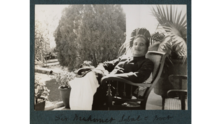
Muhammad Iqbal’s The Call of the Marching Bell (بانگِ درا, bang-e-dara), his first collection of Urdu poetry, was published in 1924. It was written in three distinct phases of his life.[53] The poems he wrote up to 1905—the year he left for England—reflect patriotism and the imagery of nature, including the Urdu language patriotic “Saare Jahan se Accha“.[50] The second set of poems date from 1905 to 1908, when Iqbal studied in Europe, and dwell upon the nature of European society, which he emphasised had lost spiritual and religious values. This inspired Iqbal to write poems on the historical and cultural heritage of Islam and the Muslim community, with a global perspective. Iqbal urges the entire Muslim community, addressed as the Ummah, to define personal, social and political existence by the values and teachings of Islam.[87]
Iqbal’s works were in Persian for most of his career, but after 1930 his works were mainly in Urdu. His works in this period were often specifically directed at the Muslim masses of India, with an even stronger emphasis on Islam and Muslim spiritual and political reawakening. Published in 1935, Bal-e-Jibril بالِ جبریل (Wings of Gabriel) is considered by many critics as his finest Urdu poetry and was inspired by his visit to Spain, where he visited the monuments and legacy of the kingdom of the Moors. It consists of ghazals, poems, quatrains and epigrams and carries a strong sense of religious passion.[88]
Zarb-i-Kalim ضربِ کلیم (or The Rod of Moses) is another philosophical poetry book of Allama Iqbal in Urdu, it was published in 1936, two years before his death. In which he described as his political manifesto. It was published with the subtitle “A Declaration of War Against the Present Times. Muhammad Iqbal argues that modern problems are due to the godlessness, materialism, and injustice of modern civilization, which feeds on the subjugation and exploitation of weak nations, especially the Indian Muslims.[89]
Iqbal’s final work was Armughan-e-Hijaz ارمغانِ حجاز (The Gift of Hijaz), published posthumously in 1938. The first part contains quatrains in Persian, and the second part contains some poems and epigrams in Urdu. The Persian quatrains convey the impression that the poet is travelling through the Hijaz in his imagination. The profundity of ideas and intensity of passion are the salient features of these short poems.[90]
Iqbal’s vision of mystical experience is clear in one of his Urdu ghazals, which was written in London during his student days. Some verses of that ghazal are:[53]
At last, the silent tongue of Hijaz has
announced to the ardent ear the tiding
That the covenant which had been given to the
desert-[dwellers] is going to be renewed
vigorously:
The lion who had emerged from the desert and
had toppled the Roman Empire is
As I am told by the angels, about to get up
again (from his slumbers.)
You the [dwellers] of the West, should know that
the world of God is not a shop (of yours).
Your imagined pure gold is about to lose its
standard value (as fixed by you).
Your civilization will commit suicide with its own daggers.For a house built on a fragile bark of wood is not longlasting[53]
English
Iqbal wrote two books, The Development of Metaphysics in Persia (1908) and The Reconstruction of Religious Thought in Islam (1930), and many letters in the English language. He also wrote a book on Economics that is now rare. In these, he revealed his thoughts regarding Persian ideology and Islamic Sufism – in particular, his beliefs that Islamic Sufism activates the searching soul to a superior perception of life. He also discussed philosophy, God and the meaning of prayer, human spirit and Muslim culture, as well as other political, social and religious problems.[53]
Iqbal was invited to Cambridge to participate in a conference in 1931, where he expressed his views, including those on the separation of church and state, to students and other participants:[53]
I would like to offer a few pieces of advice to the young men who are at present studying at Cambridge. … I advise you to guard against atheism and materialism. The biggest blunder made by Europe was the separation of Church and State. This deprived their culture of moral soul and diverted it to atheistic materialism. I had twenty-five years ago seen through the drawbacks of this civilization and, therefore, had made some prophecies. They had been delivered by my tongue, although I did not quite understand them. This happened in 1907. … After six or seven years, my prophecies came true, word by word. The European war of 1914 was an outcome of the mistakes mentioned above made by the European nations in the separation of the Church and the State.[53]
Punjabi
Iqbal also wrote some poems in Punjabi, such as “Piyaara Jedi” and “Baba Bakri Wala“, which he penned in 1929 on the occasion of his son Javed’s birthday. A collection of his Punjabi poetry was put on display at the Iqbal Manzil in Sialkot.[91]
Iqbal was deeply influenced by Punjabi Sufis. Once a comrade recited a poem by Bulleh Shah and he was “so much touched and overwhelmed…that tears rolled down his cheeks.”[92]
Modern Reputation
Allama Muhammad Iqbal, known as the “Poet of the East,” has made a significant impact on both Eastern and Western intellectual circles. His contributions to literature, philosophy, and political thought have earned him numerous accolades worldwide. His poetry, often deeply philosophical, blends Eastern mysticism with Western rationalism, inspiring millions across the globe.
In Pakistan, Iqbal is celebrated as the “national poet” and “Thinker of Pakistan.” His ideas laid the foundation for the creation of Pakistan and he is deeply admired for his vision of a separate Muslim state. His thought resonated strongly with Muslim communities in the Indian subcontinent, and his call for unity among Muslims across the world helped galvanize the Pakistan Movement.
Iqbal’s influence extends far beyond Pakistan. In Iran, he is known as Iqbal-e Lāhorī and is regarded as one of the key figures who helped inspire the Iranian Revolution. His Persian poetry, particularly works like Asrare-i-Khudi and Bal-i-Jibreel, gained immense popularity and were instrumental in shaping Iranian intellectual and political thought. The Iranian leadership, including figures like Ayatollah Ali Khamenei and Ali Shariati, often referred to Iqbal’s work as a guiding force for social and political renewal.
Iqbal’s influence also reaches across the Arab world, Turkey, and even Western countries. In Egypt, his poetry was sung by legendary artist Umm Kulthum, while in Saudi Arabia, prominent figures like Abdullah bin Faisal Al Saud were inspired by his work. In Turkey, the national poet Mehmet Akif Ersoy, known for composing the Turkish national anthem, was directly influenced by Iqbal’s thoughts on spirituality and national identity.
Western thinkers also appreciated Iqbal’s views on humanism, democracy, and social justice, though some criticized his stance on Western capitalism. His views on the oppression of the colonized and his promotion of optimism and self-empowerment have found resonance among intellectuals around the world.
Iqbal’s philosophy, which focused on self-realization, the unity of the Muslim Ummah, and the revival of Islamic intellectual traditions, continues to inspire movements in many parts of the world, establishing him as a truly global intellectual figure.
